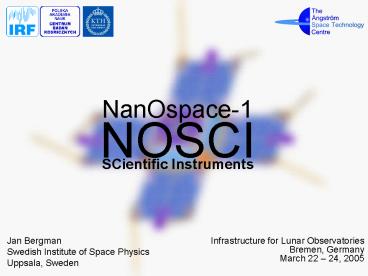NOSCI PowerPoint PPT Presentation
Title: NOSCI
1
NOSCI
NanOspace-1
SCientific Instruments
Jan BergmanSwedish Institute of Space
PhysicsUppsala, Sweden
- Infrastructure for Lunar Observatories Bremen,
GermanyMarch 22 24, 2005
2
NanoSpace-1
- Mass lt 10 kg
- Ionospheric orbit, 400-1000 km
- Massive use of Micro and Nano-Technology
- 1 Mbps S-band
- Coldgas precision attitude control lt 10µm
Jan Bergman
3
(No Transcript)
4
NOSCI
- EFVS Electric Field Vector Sensor
- LP Langmuir Probe
- ARM Anisotropic magnetoResistive
Magnetometer - FGM FluxGate Magnetometer
- AB Antennas Booms
Bremen, March 22 24, 2005
Jan Bergman
5
Organization
Instruments Contributors Investigators
Electric Field Vector SensorEFVS Physics in spaceIRF, Uppsala, Sweden Bo ThidéJan Bergman, Project manager
Lamgmuir ProbeLP Space plasma physicsIRF, Uppsala, Sweden Mats AndréJan-Erik Wahlund
Anisotropic magnetoResistiv MagnetometerARM Space plasma physics IRF, Uppsala, Sweden Anders ErikssonLennart Åhlén
Flux Gate MagnetometerFGM Alfvén LaboratoryKTH, Stockholm, Sweden Lars BlombergNickolay Ivchenko
Antennas BoomsAB CBK, Warsaw, PolandIRF, Uppsala, SwedenÅSTC, Uppsala, Sweden Zbigniev Klos Hanna Rotkael Jerzy GrygorczukLars Stenmark
Spacecraft InterfacesCAN SpaceWire ÅSTC, Uppsala, SwedenIRF, Uppsala Sweden Lars Stenmark Johan Khöler, Project ManagerFredrik Bruhn
Jan Bergman
Bremen, March 22 24, 2005
6
Objectives
- Qualify micro and nanotechnology components
- Major step forward in the technical development
of instrumentation for space science research. - Qualify new sensors and boom systems
- Shrinking the electronics is not sufficient,
sensors and boom systems must also follow suit. - Test and verify new measurement methods
- New questions in space science, inspires the need
to find new measurement methods.
Space science objectives are secondary
Jan Bergman
Bremen, March 22 24, 2005
7
Electric Field Vector Sensor
- Unique capabilities
- Dynamic 3D E-field vector, up to 20 MHz
- Unambiguous 3D wave polarization characteristics
- Statistical properties, such as wave entropy, can
be derived - Major challenge
- Amount of Signal processing capabilities versus
spacecraft heat and power requirements - Three different digital implementations are
studied - Low mass
- 1000 mm long extendible antenna, 2.7 gram
Jan Bergman
Bremen, March 22 24, 2005
8
Langmuir Probe
- Unique Capability
- Plasma density, n, and temperature, T, from DC to
10 kHz - Digital signal generator makes it possible to
measure local temperature (up to 10 kHz) - Ion masses can be derived
- Dual probe experiment
- Simultanous measurements of electrons and ions
- Interferometry
- Tests of two different probe surface coatings
(BepiColombo) - Low mass
- 273 mm long deployable boom, 0.7 gram
- ?5 mm Titanium probe, 0.3 gram
Jan Bergman
Bremen, March 22 24, 2005
9
Anisotropic magnetoResistive Magnetometer
- Unique Capabilities
- 3D magnetic field vector, B, from DC to 10 kHz
- Small size and low mass
- Volume 483.8 mm3
- One gram for the whole instrument
- Extremely interesting technology for future
satellite and Lunar missions - Frequencies up to 7 MHz
- Bad sensitivity 5-10 nT
- Prototype AMR sensors aquire 0.1 nT sensitivity
- Prototype Spin Dependent Tunneling (SDT) sensors
lt 1 pT - Mounting on a solar panel frame
Jan Bergman
Bremen, March 22 24, 2005
10
FluxGate Magnetometer
- Unique Capabilities
- 3D magnetic field vector, B, from DC to 100 Hz
- Major challenge
- Miniaturization of the sensor
- Maximum mass 10 g
- Maximum volume 20 20 20 mm3
- Possibilities to involve a partner are being
investigated - Mounting on a solar panel frame
Jan Bergman
Bremen, March 22 24, 2005
11
Antennas Booms
- Six 1000 mm extendible EFVS antennas
- Metal foil antennas
- Low mass and smooth release
- Antenna element 2.7 gram (Titanium)
- Release mechanism 20 gram
- Two 273 mm deployable rigid LP booms
- New boom design with a bellow hinge
- Low mass and smooth release
- Boom 0.7 gram
- Release mechanism 10 gram
Jan Bergman
Bremen, March 22 24, 2005
12
Resources
Subsystem Part Units Mass (g) Dimension (mm) Power (W) Data rate (kbps)
NOSCI MCM 1 20 7474 3 (10) 512 (10759)
EFVS Instrument 1 (10) (10000)
EFVS Preamp 6 0.5 1010
LP Instrument 1 (500)
LP Probe 2 0.3 ?5
ARM Instrument 1 0.5 1010 (256)
ARM Sensor 1 0.3 483.8
FGM Instrument 1 (3)
FGM Sensor 1 10
AB Antenna 6 2.7 ?5 1000
AB Release 6 20 481426 (2.5)
AB Boom 2 0.7 ?5 273
AB Release 2 10 481426 (10)
? NOSCI 192 3 (10) 512 (10759)
Jan Bergman
13
Obstanovka-1 on ISS
- RFA, joint Polish Swedish experiment
- Obstanvka means Environment in Russian
- Launch at the beginning of 2007 with Progres and
deployed by ISS crew
Jan Bergman
14
Kompas satellites
- Kompas-2
- RFA joint Polish Swedish experiment
- Disaster warning satellite
- Launch in May June 2005 from Russian nuclear
submarine - Kompas-2N
- Identical to Compass-2
- Launch in Sept Dec 2005
- Precursors to Vulkan fleet of up to 8 satellite
- One satellite per year in next 5 10 years
- Multiple Spacecraft, Multiple Instrument onboard
data processing - Collaboration with Uppsala DataBase Laboratory
Jan Bergman
Bremen, March 22 24, 2005
15
LOIS
- LOIS (LOFAR Outrigger In Scandinavia)
- Receiver on-line for three years without failure
- Five receivers now on-line at the test station
Jan Bergman
Bremen, March 22 24, 2005
16
Chandrayaan-1
- Indian mission to the Moon 2008
- Invited to participate with EFVS but not yet
formally selected - Collaboration between Sweden, Poland and India
Jan Bergman
Bremen, March 22 24, 2005
17
Thank you for listening!
Jan Bergman
Bremen, March 22 24, 2005

